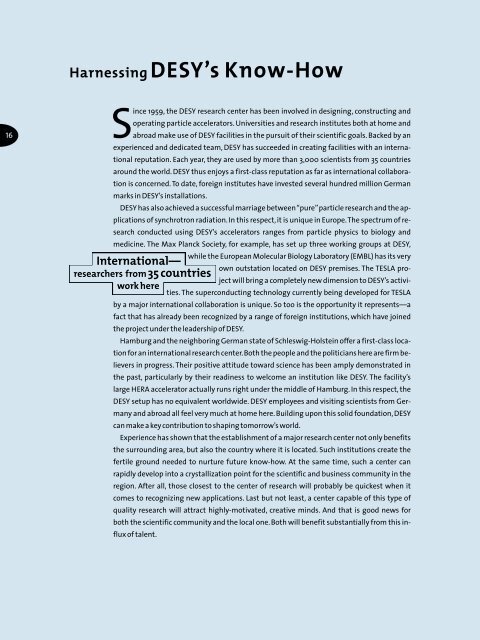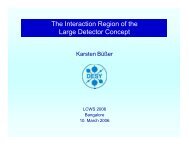TESLA Brochure - ACFA Joint Linear Collider Physics and Detector ...
TESLA Brochure - ACFA Joint Linear Collider Physics and Detector ...
TESLA Brochure - ACFA Joint Linear Collider Physics and Detector ...
You also want an ePaper? Increase the reach of your titles
YUMPU automatically turns print PDFs into web optimized ePapers that Google loves.
16<br />
Harnessing DESY’s Know-How<br />
Since 1959, the DESY research center has been involved in designing, constructing <strong>and</strong><br />
operating particle accelerators. Universities <strong>and</strong> research institutes both at home <strong>and</strong><br />
abroad make use of DESY facilities in the pursuit of their scientific goals. Backed by an<br />
experienced <strong>and</strong> dedicated team, DESY has succeeded in creating facilities with an international<br />
reputation. Each year, they are used by more than 3,000 scientists from 35 countries<br />
around the world. DESY thus enjoys a first-class reputation as far as international collaboration<br />
is concerned. To date, foreign institutes have invested several hundred million German<br />
marks in DESY’s installations.<br />
DESY has also achieved a successful marriage between “pure”particle research <strong>and</strong> the applications<br />
of synchrotron radiation. In this respect, it is unique in Europe.The spectrum of research<br />
conducted using DESY’s accelerators ranges from particle physics to biology <strong>and</strong><br />
medicine. The Max Planck Society, for example, has set up three working groups at DESY,<br />
while the European Molecular Biology Laboratory (EMBL) has its very<br />
own outstation located on DESY premises. The <strong>TESLA</strong> project<br />
will bring a completely new dimension to DESY’s activi-<br />
work here<br />
ties. The superconducting technology currently being developed for <strong>TESLA</strong><br />
by a major international collaboration is unique. So too is the opportunity it represents—a<br />
fact that has already been recognized by a range of foreign institutions, which have joined<br />
the project under the leadership of DESY.<br />
Hamburg <strong>and</strong> the neighboring German state of Schleswig-Holstein offer a first-class location<br />
for an international research center.Both the people <strong>and</strong> the politicians here are firm believers<br />
in progress. Their positive attitude toward science has been amply demonstrated in<br />
the past, particularly by their readiness to welcome an institution like DESY. The facility’s<br />
large HERA accelerator actually runs right under the middle of Hamburg. In this respect, the<br />
DESY setup has no equivalent worldwide. DESY employees <strong>and</strong> visiting scientists from Germany<br />
<strong>and</strong> abroad all feel very much at home here. Building upon this solid foundation, DESY<br />
can make a key contribution to shaping tomorrow’s world.<br />
Experience has shown that the establishment of a major research center not only benefits<br />
the surrounding area, but also the country where it is located. Such institutions create the<br />
fertile ground needed to nurture future know-how. At the same time, such a center can<br />
rapidly develop into a crystallization point for the scientific <strong>and</strong> business community in the<br />
region. After all, those closest to the center of research will probably be quickest when it<br />
comes to recognizing new applications. Last but not least, a center capable of this type of<br />
quality research will attract highly-motivated, creative minds. And that is good news for<br />
both the scientific community <strong>and</strong> the local one. Both will benefit substantially from this influx<br />
of talent.<br />
International—<br />
researchers from 35 countries




